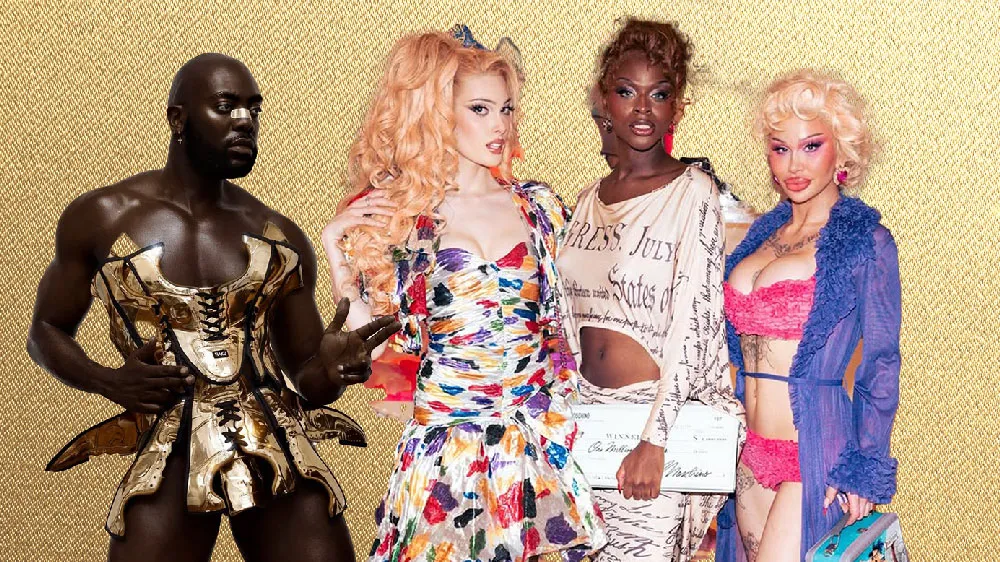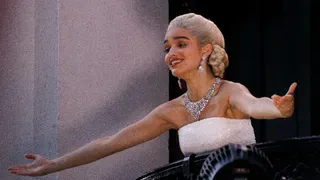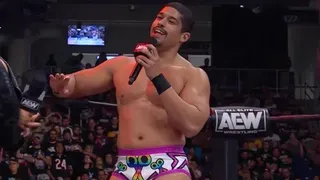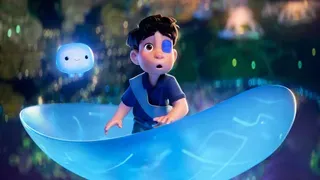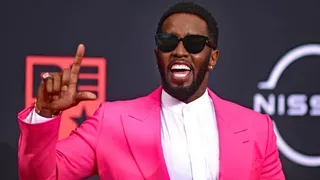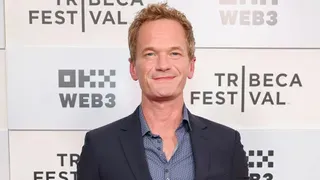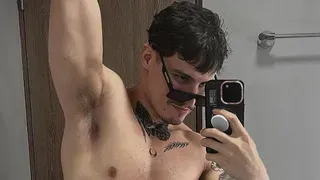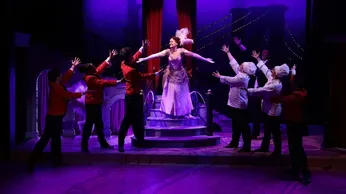
May 21
At the Lyric Stage, Aimee Doherty Wants to Make Dolly Her Own
Robert Nesti READ TIME: 11 MIN.
With Carol Channing strutting the runway and batting her saucer eyes to the far reaches of the sold-out St. James Theatre, there was no bigger Broadway hit than "Hello, Dolly!" during the 1960s. Pearl Bailey followed her in a celebrated all-black version, Phyllis Diller had her turn, and Ethel Merman closed the show written for her. "Dolly" ran six years, Bailey toured it, Mary Martin starred in it in London, and Barbra Streisand on screen. Channing toured it right up until the 1990s, then Bette Midler brought it Broadway again in 2017, and everyone fell in love with the matchmaking Dolly all over again in the new century.
Over the next few weeks, Boston audiences will have the opportunity to revel in Dolly's company as the Lyric Stage brings the Jerry Herman-Michael Stewart musical to its Clarendon Street space in a production directed by Maurice Emmanuel Parent. As the titular busybody is Elliot Norton Award-winning actress Aimee Doherty. "I put my hand in here," she sings by way of introduction. "I put my hand in there." Within minutes of this adaptation of Thornton Wilder's "The Matchmaker," she's cagily setting up romantic liaisons, dissipating others, and saving the biggest one – the half-millionaire Horace Vandergelder for her own.
While "Hello, Dolly!" is often thought as a "Big Lady" show (a mid-20th century musical genre it introduced), it is also a canny adaptation of Thornton Wilder's 1954 comedy that gently critiques antiquated male views on marriage and social status through the machinations of its shrewd heroine – a feminist entrepreneur seeking the moment when, as she puts it, she can rejoin the human race.
When the audition notice went up for "Dolly," Doherty wasn't sure if she was quite ready for the role. In recent times, it has been played by actresses at least a decade older than her, and she wasn't sure if she was quite right for the show's other soprano role, the widower Irene Malloy. But put her defenses down, took a leap, and was cast in the Lyric Stage Boston production, which runs through June 22. (For more information, follow this link.)
Her actions reflect a similar, and more life-changing leap, that Doherty took some twenty years ago when she put her successful career as an environmental scientist behind to pursue acting full-time. Up until then, she was working in community theater, but after success in the SpeakEasy Stage Company's 2004 production of 'Company," she decided to pursue what she loved. By coincidence, she was laid off from the full-time job she had for 15 years and saw it as a sign that the time had come for her to change careers. Since then she has been one of the brightest and most resourceful musical theater performers in the city, having been awarded two consecutive Elliot Norton Awards for performances in four musicals (2014 for "On the Town" at the Lyric Stage Boston and "Hairspray" at Wheelock Family Theatre; and 2015 for "Far From Heaven" at the SpeakEasy Stage and "Into the Woods" at the Lyric Stage Boston). She won one of her three IRNE Awards for her Sally Bowles in Moonbox Productions' "Cabaret" in 2018; and appeared in three Sondheim musicals at the Huntington Theatre, including Maria Friedman's acclaimed revival of "Merrily We Roll Along" where she had the plum supporting role of Gussie Carnegie. And just this past Spring, she appeared opposite Eddie Shields in SpeakEasy Stage Company's acclaimed revival of "A Man of No Importance."
But Doherty had Dolly on her mind when EDGE caught up with her for a conversation as she waited for a rehearsal to begin.
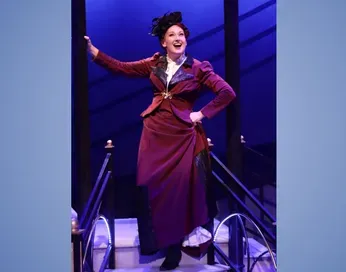
Source: Mark S. Howard
EDGE: Dolly is one of those famous 'Big Lady' musical roles. It is up there with Rose in "Gypsy" and Mame in "Mame." How do you feel tackling such a big role?
Aimee Doherty: Dolly talks a lot. Dolly sings a lot. She's in a lot of numbers. Yeah, it is challenging, I feel ready for it. I played Rosalind, in "As You Like It," and that was another big role in a big show. I've had leading roles before, but this is, this is next level. But I think I'm ready for it. I'm excited and, obviously a little nervous to, to see how people react.
EDGE: What do you like about Dolly?
Aimee Doherty: Oh, gosh, what's not to like about Dolly? She's the smartest person in the room. She's very witty, and very compassionate. You know, she's looking out for people. She's a matchmaker, so, she's not giving everyone exactly what they're asking for, but she's giving them exactly what they need. And that's pretty cool; and she does it with a lot of wit and humor and heart. And I find it unexpectedly deep.
EDGE: What did you know about "Dolly" before getting cast?
Aimee Doherty: I saw the movie version with Barbra when I was a teenager, but just once. And then I saw the Betty Buckley tour of the recent Broadway revival at The Opera House that came through town a few years ago because my friend Morgan Kerner was in it. I was sitting way, way back; but even from that perch it was a wonderful experience – so full of joy and happiness. But, naturally, those more subtle moments of storytelling got lost in the vastness of the Opera House. I think what's going to be really cool about our production is that intimacy. I'm excited for people to experience the story in such an intimate setting, with people on three sides of us. You know, on stage, basically with us.
EDGE: How does it feel to play a role associated with so many famous female stars?
Aimee Doherty: I have been asked that a lot lately. Well, not having seen them, I don't have that to draw upon. And that's probably just a good thing, because nobody wants to see me try to be Barbra Streisand, or me try to be Bette Midler or Carol Channing. If you want to see Barbra Streisand in the role, watch the movie. It's her. Don't expect me to do a weird imitation of Barbra Streisand, or Carol Channing. Though I must admit to growing up listening to the original cast album that my mother had that I grew up with Carol Channing as Dolly. My mom was a big Broadway fan and when she passed, I inherited all of her cast recordings.
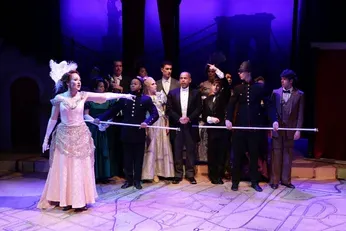
Source: Mark S. Howard
EDGE: It's funny that you mentioned Channing because she didn't quite sing the songs...
Aimee Doherty: Yes. And the songs have a lot more range than what you hear on that album. What's really cool is that Dan Rodriguez, the music director of this version, has an encyclopedic knowledge of musical theater. He knows every single version of how the songs were previously sung. He knows the Pearl Bailey arrangements; he knows the Bette Midler arrangements; he knows the Bernadette Peters. And he knows the Carol Channing versions, so we were able to literally go song by song and choose the key that's good for my voice. I will say my voice is a lot higher than Carol's, a little higher than Bette's, and a touch lower than Barbra's, and he's crafting the orchestration around my voice, which is really a lot of work. I'm really fortunate that he was so on board and picking the right keys for my voice, instead of just using the orchestration written for Carol Channing and tell me, 'I hope you can sing in the basement.'
EDGE: You know, you mentioned that there was a lot more depth to the role as you began to get to know the musical. Can you explain?
Aimee Doherty: It just struck me because from the jump, from the very opening, monologue, Dolly evokes her husband like five times, She keeps referring to him over and over and over again. It's obvious that she was deeply, deeply in love with him, and he passed quite young; and it feels like she just hasn't been able to move on from that. He's on the tip of her tongue in every single sentence. And right before she sings "Before the Parade Passes By," she has this beautiful monolog about asking him to let her go. I lost my mother when I was very young, and speaking as a person who has experienced that kind of loss at a really young age and quite unexpectedly, it's really hard to move on. It's hard to let go of that grief. This has made Dolly absolutely poignant for me.
And she says that life is for living. That you have got to get out there and do what you need to do to live. You have to forgive yourself and forgive others. You have to move on, because life's too short. That's the lovely message that resonates with me. There is also a beautiful monologue at the end of the show where she's talking about money. She's talking about Horace's money, and how the consolidation of money can make an incredible different difference in a person's life; that is, just to have a little money can really make a difference in the quality of a person's life. But money should not be consolidated with just the wealthy. It needs to be circulated. And what she says is that money is like manure. It doesn't do any good unless you spread it around, helping young things grow so. I had heard those lines before, but they really struck with me and felt particularly timely right now. And I'm hoping, in an intimate space that sentiment will resonates with the audience even more. That's my hope.
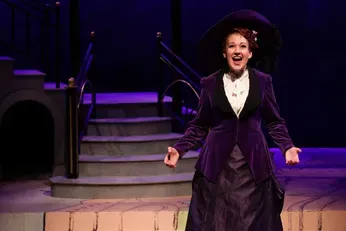
Source: Mark S. Howard
EDGE: You're on the younger end of Dolly. Have you heard that you are too young to play the part.
Aimee Doherty: I have to admit that I was kind of surprised myself. I When the audition notice went out, I actually texted Maurice (Maurice Emmanuel Parent, the director), because we've grown up in Boston theater together. I was in his first show in Boston – "Ragtime" at the New Rep, and we've done maybe 10 or 12 shows together very early on in the in our careers. I don't think that we've worked together since "Merrily We Roll Along' at the Huntington; but because we know each other well enough, and I knew he was directing it, and I just reached out to him via email or text. I felt in a weird spot; but wanted to show him something. He agreed I was a little on the young side, so when I went to audition, I didn't have a lot of angst. I just thought if I don't do it now, there will be other opportunities for it later on. I saw it as a long shot and had fun with the audition, and it worked. It's funny how not having pressured myself freed me up to some stuff that I might have been too worried to do if I had seen Dolly a must-get role.
And I understand people's thinking that I might be on the younger side, although I would challenge that. I think Carol Channing was younger than I am when she first played the part. And Barbara was only 27. So, there is precedent for a younger Dolly. But there's also precedent for an older Dolly. I mean Betty Buckley was over 70 and she was amazing. I just hope that a half-hour in, the audience just relaxes and enjoys my interpretation of the part.
EDGE: What is it like putting a big Broadway show into a more intimate space?
Aimee Doherty: There won't be a big train. And we are not in a proscenium space. We are thrust stage. I can say that if anyone can choreograph, "Hello Dolly!." It is Ilyse Robbins, because she knows that space so well, and she knows that Gower Champion-type of movement so well. And, the ensemble, oh my gosh, they're such beautiful singers and dancers, and on top of that, they're just incredibly committed.
EDGE: Is the key to a great Dolly just being yourself?
Aimee Doherty: I that's true of all roles -- you got to bring a lot of yourself, the circumstances will be written around you. I find that's true with most of actors that I enjoy working with, like the Eddie Shields, whom I just played with "An Man of No Importance" at the SpeakEasy. He has played a million different roles, but he's always brings himself in to every single part. He doesn't try and cover that up completely, and I think that lets the humanity of the character shine through. I don't know if that makes any sense, but yeah, I think that not only with Dolly, but with any part. I think that the more an actor can bring of their authentic selves, the better off and the more honest the performance usually is.
"Hello, Dolly!" continues through June 22 at the Lyric Stage Boston, 140 Clarendon Street, Boston, MA. For more information, For more information, follow this link.
Robert Nesti can be reached at [email protected].
